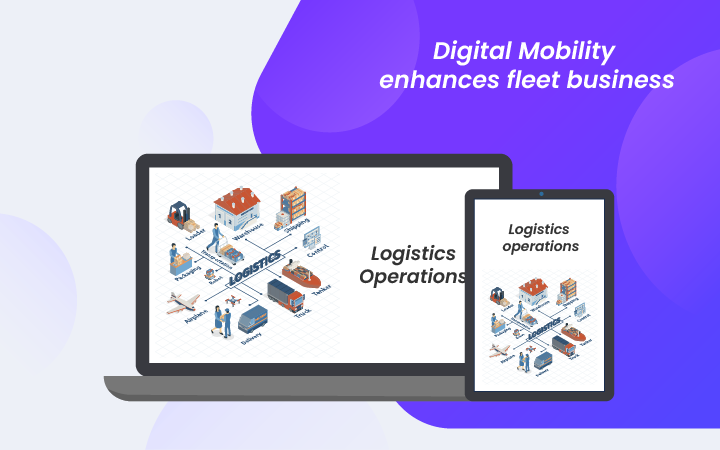How Digital Mobility enhances fleet business?
Summary
The article discusses how digital mobility has revolutionized the fleet business by addressing the challenges faced by the transport industry in the past. It has enabled transparency in communication, simplified fleet management tasks, improved efficiency in fleet performance, enabled real-time monitoring, and facilitated effective ride-sharing services. Digital mobility has made fleet operations faster, user-friendly, and reliable.
Digital mobility allows the users to communicate, participate, contribute, gather information, share knowledge, create content and entertain with the help of an electronic device. Most probably it is a mobile.
We humans drive digital mobility or digital mobility drives. Digital mobility has become a part of our lifestyle. We do not have a routine without digital mobility. We use devices for our basic needs nowadays like ordering food, paying your electricity bill, calling for your water cans, etc.
When these basic necessities of life are driven by digital mobility, then definitely digital mobility is over the top of this digital world. In this article, I have shared my view on the importance and the impact of digital mobility in the fleet business.

Challenges faced by the transport industry without digitalisation
As we turned over the pages of history, all the documentations, payments were done manually. Manual processes would lead to errors and delays that affect the flow of business.
Time management has always been the key factor in any business especially in transport as a lot of travel and money is involved in it. Manual processing of bills, documents and information sharing were major drawbacks of the transport industry without digital mobility.
There was no fleet monitoring or any control over the drivers, fuel usage, alert calls for any intimation during emergencies. Everything functioned with just the trust and loyalty without any monitoring and online control over the fleets and the drivers which were a tough time for the entire process of fleet business.
Importance of digitalisation in fleet business
Digital mobility has changed things around for the fleet business as everything is under control at the tip of the fingers. Immediate information or call to anyone involved in the fleet business, they are just a call away from you.
You need to make faster clearance of your pending bills, you are just a press away from clearing your payments. Digital mobility has made the business process so much easier, faster and user friendly.
Apart from these perks, the most important aspect of digital mobility in the near future is that technological advancements will keep moving forward as it gets better and smarter.
Similarly the employees need to update themselves and must be aware of the technology involved and get user friendly to ensure that the process is understood clearly for the smooth business process.
In what way digital mobility has boosted fleet business?
E-bills, invoices are generated digitally and they are cleared immediately anywhere and anytime required. These advanced techniques that ensure easy and safe financial clearances have definitely boosted up the fleet business to a huge extent.
Digital mobility has boosted several other factors in fleet business as discussed below.
1.Transparency in Communication
Communication amongst the teams is a key to ensure smooth functioning of the business. Earlier as discussed, before digitalisation, things worked only based on trust and loyalty. Nowadays things have turned more professional as everything is under control and surveillance.
Anytime, anyone can get connected to each other through calls or messages. Fleet managers can be in touch with the drivers through calls for important updates. Digital mobility has helped business people with transparency in communication.
There is no communication lag in digital mobility as everyone is connected digitally anytime from anywhere. Such transparency in communication ensures the business to be on the right track without any abnormalities in the process.
2.Fleet management tasks made simple
Planning and paperwork is very important for a successful business. Any sort of planning, writings or information to be shared can be processed digitally without any papers involved. Digital mobility has made such tasks simple and user friendly.
Documentations and Data storage is one of the major factors boosted by digitalisation. Manually written datas can have human errors or the files might be missed but the digitally stored datas cannot be lost and there are less chances of errors.
Hence the management of fleets as per plan becomes easier and faster to refer and share the store information amongst each other for clarity of thoughts during the fleet operations. Also multiple copies can be made to share the data digitally to “n” number of people involved in the complete process.
3. Improved efficiency in fleet performance
Efficiency of the fleet performances is based on several factors like fuel usage, driving skills, maintenance, reporting, etc.
Control over the fuel usage has also been updated with digital information shared instantly by the drivers to the fleet managers and vice-versa that ensures the free flow of fleet movements.
Driver cannot over speed or misuse the vehicle, if done so, he can be warned or alerted immediately by the fleet management through a call or message. Such facilities are achieved through Telematics which are the trending aspects of digital mobility in fleet business.
Any abnormality during the fleet operations like collisions or breakdowns, digital mobility allows the driver to report the situation to management immediately for the possible solutions.
4.Real time monitoring
Real time fleet monitoring is another important aspect of logistics which has been boosted up to a level that the fleet manager can have an eye on the current location of the moving fleets in his hands through his mobile. Digitalisation has enhanced fleet management through GPS tracking facilities.
Fuel monitoring is another aspect of real time monitoring where the drivers can be warned or alerted in case of vehicle idling or vehicle hosting which leads to wastage of fuel as vehicle is not moving for a longer time.
GPS tracking allows the fleet management to monitor the current location of fleets in the mobiles to guide and direct the drivers to be on the right track to make the trip successful.
5.Enables effective ride sharing services
Digital mobility has made work easier for the producers and manufacturers to look out for the vehicle to transport their goods to the customers. Ridesharing services or Ride hailing is the facility in which a person can use a specific mobile application to order, reserve or book a vehicle for transportation.
Digital mobility has not only boosted up the fleet business, it has also contributed fleet business to be eco-friendly through ride sharing or ride hailing services. Every producer or the manufacturer need not use his own vehicles to transport the goods. There are lots of vehicles that are not under operation, they can be hired by any of the companies looking for fleets.
The management can hire a good vehicle and a driver through the mobile apps for the fleet operations which would reduce the number of vehicles on road that can result in decrease of emission levels.
Sometimes, the company can have a shortage of vehicles or the drivers, in such cases, digital mobility makes way for the management to get the vehicles and drivers through apps.
Sushanthi
Sushanthi is a Content Writer who wishes to be the voice of brands to project their innovative ideas and stories through her writing skills.

